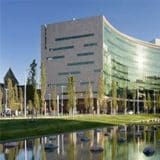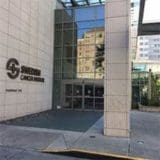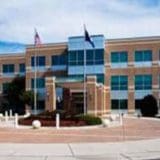01. What Are TTFields?
What Are TTFields for Mesothelioma?
Tumor Treating Fields (TTFields) are a new mesothelioma treatment. This therapy is administered by a portable electronic device called Optune Lua™. It passes gentle electric fields through the patient’s skin to slow cancer cell growth and help prolong patient survival.
Patients can take the device nearly anywhere and use it for the recommended 18 hours per day. This makes TTFields the only mesothelioma treatment patients can receive at home.
The U.S. Food and Drug Administration (FDA) has approved the Optune Lua:
- As a humanitarian use device
- For the treatment of inoperable pleural mesothelioma in combination with chemotherapy
A medical device company called Novocure® manufactures the Optune Lua. The company has several ongoing studies looking into the device’s use in other cancers. At last update, none of the listed studies included peritoneal mesothelioma patients. But Novocure is investigating TTFields in other abdominal cancers. If TTFields work well in those cancers, the company may look into its effects on peritoneal mesothelioma sometime in the future.
What Are the Benefits of TTFields Therapy for Mesothelioma?
TTFields may offer several potential benefits for mesothelioma patients. They include mild side effects, convenience and improved quality of life.
The advantages of TTFields treatment may vary because of individual factors. Mesothelioma patients can discuss TTFields with their oncologists to better understand potential benefits.
02. How Do They Work?
How TTFields Work to Treat Cancer
TTFields use low-intensity electricity to disrupt cancer cell growth. The device sends energy through the skin toward the tumor. This may break apart and destroy tumor cells. Over time, TTFields can interrupt many rounds of cancer cell growth. This may improve mesothelioma prognosis.
According to Novocure, TTFields have not been shown to affect healthy cells.
Why Do Electric Fields Disrupt Cancer Cell Growth?
Cancer cells grow faster than most healthy cells. Cancer cells grow by copying the parts of one tumor cell and dividing them evenly between two new cells.
Normally, cancer cells use specific proteins to grow and divide correctly. But TTFields can make the proteins move in random or unexpected ways. This motion makes it hard for cancer cells to divide their copied parts into two new cells correctly. In fact, TTFields may even cause these proteins to pull the dividing cell into pieces and destroy it.
How Is TTFields Treatment Administered?
TTFields for mesothelioma are given alongside traditional chemotherapy. The chemo consists of pemetrexed and either cisplatin or carboplatin. Mesothelioma patients receiving this therapy may experience the following:
- Continuous TTFields applied to the chest
- Intravenous (IV) chemotherapy once every three weeks for up to six cycles
Patients may continue receiving TTFields until their cancer starts growing. They may also choose to stop therapy because of serious side effects or if a physician recommends it.
How Do Patients Use the Optune Lua?
The device is fairly simple to operate once an oncologist or member of the care team demonstrates how to use it. The Optune Lua is designed for patients to use on their own. The portable device consists of three main parts:
- Electric field-transferring stickers (called ILE transducer arrays in the manual)
- Electric field generator (the TTFields device)
- Power source (either a battery or a plug-in power supply)
Use of the TTFields device follows this general set of steps:
- The patient or caregiver positions four electric field-transferring stickers. They place two on the patient’s chest and two more on their back.
- The patient connects the sticker cords to the TTFields device.
- The patient powers the TTFields device with a battery or plug-in power supply.
- The patient starts treatment by pressing the TTFields button on the device.
The operation manual encourages patients to keep the device turned on for 18 hours per day. Since the device can draw power from batteries, patients can take it on the go. It comes with a shoulder bag and strap to help make the device more portable.
Who Is Eligible for TTFields Mesothelioma Treatment?
Patients with inoperable pleural mesothelioma may be good candidates for TTFields therapy. Eligibility can depend on factors like the patient’s goals and stage of mesothelioma.
Patients with certain characteristics may not be eligible for TTFields treatment, including:
- Implanted electrical devices like pacemakers or spinal cord stimulators
- Sensitivity to conductive gel like the type used for medical electrodes
- Active or potential pregnancy
Mesothelioma patients considering TTFields can discuss this therapy with their oncologists. The doctor can help explain their eligibility and potential risks and benefits.
Resources for Mesothelioma Patients
03. Effectiveness of TTFields
How Effective Are TTFields to Treat Mesothelioma?
Data from a clinical trial indicates TTFields may improve mesothelioma life expectancy. Trial patients with pleural mesothelioma who received TTFields and chemo had a median survival of 18.2 months.
TTFields have approval for treating inoperable (unresectable) pleural mesothelioma alongside chemotherapy. Historically, these patients have had limited treatment options, many with disappointing efficacy. But mesothelioma research has changed that.
Patients with inoperable pleural mesothelioma have several effective treatment options. TTFields therapy now stands among those options. Treatment with TTFields and chemo seems to be about as effective as other therapies.
- Checkpoint inhibitors: Immune checkpoint inhibitors (ICIs) allow the immune system to fight cancer. The ICI combo of Opdivo® (nivolumab) + Yervoy® (ipilimumab) has FDA approval to treat inoperable pleural mesothelioma. Patients receiving this therapy had a median survival of 18.1 months. This is nearly identical to survival with TTFields and chemo.
- Chemotherapy: Standard chemotherapy for inoperable mesothelioma consists of pemetrexed and cisplatin or carboplatin. In studies, patients treated with this combo had median survivals ranging from about 12 to 14 months. Adding TTFields to this chemo regimen seems to improve survival by about 4 to 6 months.
Patients interested in TTFields can discuss this option with their oncologists. Mesothelioma doctors can help patients understand how TTFields may improve their survival.
04. Side Effects & Precautions
What Are the Side Effects of TTFields?
The most common side effect of TTFields therapy is skin irritation. In fact, it’s the only side effect doctors linked to TTFields during the clinical study.
However, patients may experience side effects related to the chemotherapy administered with TTFields. Even so, severe side effects (adverse events) are rare. Of study patients, 10% or fewer experienced a severe side effect. In general, the side effects of TTFields and chemo are similar in type and severity to those of chemo alone.
Oncologists can help patients manage the side effects of treatment. For example, patients may receive a prescription for hydrocortisone to treat skin irritation. Applying this cream when replacing the stickers can help relieve this side effect.
Patients should discuss any side effects with their treatment team as soon as they arise. This can help care providers intervene and prevent the symptom from worsening.
05. Cost of TTFields
How Much Does Optune Cost?
The cost of TTFields treatment can vary based on a patient’s care location and insurance status. Participation in a TTFields clinical trial may help reduce out-of-pocket costs.
Cost information for mesothelioma patients using the Optune Lua has not been shared publicly. But it may be similar to the cost for glioblastoma patients. As of 2020, TTFields therapy for glioblastoma was $21,000 per month without insurance. Insurance companies may or may not cover the device for mesothelioma.
The TTFields device manufacturer, Novocure, may help some patients with treatment costs. Currently, Novocure determines cost based upon the patient’s income and insurance coverage. Patients concerned about TTFields treatment cost should discuss it with their care teams. The team can discuss payment options. They may also be able to suggest more cost-friendly, but still effective treatments.
06. Where to Find TTFields
Where to Receive TTFields Treatment
Patients can receive TTFields therapy at Novocure-certified cancer centers. Nationwide, there are more than 50 such centers. Locations are conveniently located for thousands of patients, including those in rural areas. The centers below represent a small number of these certified facilities.
Mesothelioma patients interested in TTFields should discuss this therapy with a mesothelioma expert. The specialist can explain eligibility requirements and predicted benefits for individual cases.



















